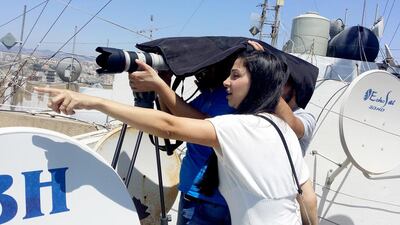Journalist Robert Fisk’s recent visit to Abu Dhabi has generated plenty of headlines. He passed on his opinions on a range of issues, from tribal loyalties to housing conditions – and whether Abu Dhabi-owned Manchester City or the Qatari owned Paris St Germain are the greatest Gulf-owned football teams.
One headline that flew under the radar, however, was that the Independent newspaper's veteran, multi-award-winning Middle East correspondent also took time out to help Abu Dhabi-based Lebanese journalist and filmmaker Samia Badih with her in-production documentary about the 1982 Israeli invasion of Lebanon, a war Fisk covered as the Middle East correspondent for The Times.
“A friend of mine in Lebanon told me Fisk was in Abu Dhabi and gave me his number,” says Badih. “I’d been trying to contact him for months, but he doesn’t use email. The minute I got in touch, he was so helpful and told me about everything he’d seen at that time in Lebanon, working as a reporter. It was great to get his input, even more than 30 years later.
“When I started researching my film, I’d used one of Fisk’s books, as there was a big chapter about that period in it, and I asked him how many people had died during the invasion. He told me we were talking about 17,500 people. That’s 17,500 people like my uncle, Rasheed.”
Badih’s uncle was killed by an Israeli airstrike on Saida in 1982, three years before the filmmaker was born. The eerie silence from her family about this man she never knew, combined with the fact that everybody in Saida seemed to know who he was, convinced Badih that his story was crying out to be told.
So, she quit her job as a journalist and in 2013 set out to tell the story of Rasheed.
“I started doing my first few interviews in 2013 and realised I was tapping into something really big,” she says. “In 2014, I launched a crowdfunding campaign and raised US$12,000 (Dh44,000), so last summer, I really picked up and did lots of filming. I reached out to friends of Rasheed, some of whom hadn’t been to Lebanon in years, and it was a great learning experience trying to piece my uncle together from people who knew him.
“I’m now in post-production and hope to have it completed by the end of June, in time to start sending it around for festivals at the end of the year.”
Badih learnt that her uncle was a political and social activist in Saida, and the leader of a political party, who was revered and respected within the community – but also that a strange reluctance to deal with the events of 1982 persists among residents.
“Of course, the main story is my uncle,” she says. “But it’s also about the fact that the real victims of war are not those who die, but those who survive them.
“I also deal with how my mother and my grandmother have dealt with it. If a girl loses her boyfriend in a car accident, she’ll go and get help, but in 1982 that wasn’t an option. There was this huge community of traumatised people, it’s not just my family.
“I knew they were trying to help me and give me what information they could, but it was like there was a barrier. There was never any closure about what happened. That was a real feeling I got from everyone I spoke to, even those who didn’t know Rasheed that well.
“It was like they were really emotional, but trying to stop themselves from becoming emotional.
“My family were very close. My mother’s father died young and Rasheed was the man of the house. He grew into a man who wanted to bring change to the community.
“My immediate family had fled a few days before Rasheed’s death. I think my mother always had it at the back of her mind that something might happen because he was a political leader, but she was still shocked and traumatised when she found out that not only had Rasheed died in the air raid, but his wife and children, too.
“She just didn’t know how to deal with it and I think that’s why the silence carries on to this day.”
Perhaps when the film is complete, that’s a silence that will finally be broken.
cnewbould@thenational.ae

